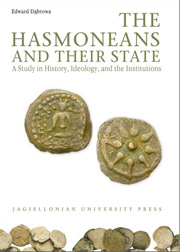Book contents
- Frontmatter
- Contents
- Introduction
- Abbreviations
- Part I Judea under the Hasmoneans (167–63 BCE)
- Part II The Institutions of the Hasmonean State
- Part III Society
- 1 Judean Society During Hasmonean Rule
- 2 The Hasmoneans and their Critics
- 3 Social Attitudes Toward the Hasmoneans
- Conclusions
- Bibliography
- Index of Personal Names
- Index of Place Names
- Index of Ancient Sources
- Electrum - Volumes Published
- The Hasmonean State
2 - The Hasmoneans and their Critics
from Part III - Society
Published online by Cambridge University Press: 05 September 2014
- Frontmatter
- Contents
- Introduction
- Abbreviations
- Part I Judea under the Hasmoneans (167–63 BCE)
- Part II The Institutions of the Hasmonean State
- Part III Society
- 1 Judean Society During Hasmonean Rule
- 2 The Hasmoneans and their Critics
- 3 Social Attitudes Toward the Hasmoneans
- Conclusions
- Bibliography
- Index of Personal Names
- Index of Place Names
- Index of Ancient Sources
- Electrum - Volumes Published
- The Hasmonean State
Summary
The Hasmoneans, with their political and religious status, were often the subject of criticism by those demanding that they step down from some of their titles. Some texts composed in the second half of the 2nd century and first half of the 1st century BCE are thought to be critical toward the Hasmoneans, and for this reason it is worth presenting them here, if only as a brief review, what was the substance of the criticism and the form in which it was expressed.
At the core of all anti-Hasmonean attitudes was opposition to the vastness of power they combined in their hands. The Pharisees were the first to venture to voice publicly their opinion on the matter. Their criticism, though veiled (the ostensible pretext given for suggestions that John Hyrcanus submit a resignation from high priesthood were rumors of his impure lineage), proved pregnant with consequences. First, a crisis ensued in relations between the ruler and the Pharisees, as a result of which they lost their influence, and soon afterward, under Alexander Jannaeus, the crisis escalated into a full-scale conflict. Criticism so expressed proved ineffectual, what with the lack of any desired outcome and with repressions they suffered. The behavior of the Pharisees after Alexander Jannaeus' death also implies that, despite their declared anti-Hasmonean attitudes, they were willing to collaborate with them under certain circumstances.
- Type
- Chapter
- Information
- The Hasmoneans and their StateA Study in History, Ideology, and the Institutions, pp. 173 - 182Publisher: Jagiellonian University PressPrint publication year: 2009



